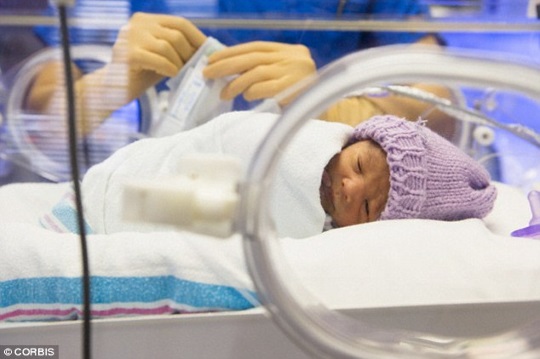10+ Ways to Boost Your Fertility
It's an aspect of our health that most of us take for granted: Have sex, get pregnant, right? In reality, even minor stressors can throw your body out of whack. If you're trying to conceive, these simple health moves can help protect your fertility. 1.Eat Well
Here's good news: Staying well nourished boosts your odds of conceiving! Make sure to include enough protein, iron, zinc, vitamin C, and vitamin D in your diet, because deficiencies in these nutrients have been linked to lengthened menstrual cycles (and therefore less frequent ovulation) and a higher risk of early miscarriage. Ask your doctor if you should take a daily multivitamin supplement. And be sure to eat protein-rich foods, such as meat, fish, low-fat dairy products, eggs, and beans.
2.Think Before Drinking
A growing body of research has linked alcohol consumption with a decreased ability to get pregnant (it can also harm a developing fetus). Alcohol alters estrogen levels, which may interfere with egg implantation, although pouring an occasional glass of Pinot with your dinner is unlikely to harm fertility. You should also consider cutting back on caffeine while you try to conceive and during your pregnancy. Although study results have been mixed, research suggests that caffeine affects female hormone levels and may affect how long it takes to get pregnant. The bottom line: If you're thinking about getting pregnant, be a teetotaler and limit your daily java fix to 200 mg of caffeine per day. (That's about one to two cups or 12 ounces of coffee.)
3.Watch Your Weight
Aside from the other risks it poses to your health, excess body fat can lead to an overproduction of certain hormones that disrupt ovulation. Your cycles may be less regular, you may ovulate less often, and you lower your chances of getting pregnant. On the flip side, too little body fat means your body may not produce enough hormones to ovulate each month or to sustain a pregnancy if you do conceive. Exercise can help you maintain a healthy weight. Just don't overdo it, says Christopher Williams, M.D., a reproductive endocrinologist at the University of Virginia, in Charlottesville, and author of The Fastest Way to Get Pregnant Naturally. Talk to your doctor or midwife about your workout routine before trying to get pregnant.
4.Steer Clear of Pesticides
Many pesticides and herbicides -- chemicals used to kill insects and weeds that threaten crops -- decrease male fertility and may affect female fertility by inhibiting ovarian function and disrupting the menstrual cycle. Most of the studies done to date deal with how occupational exposure affects fertility, but a study published in the March 2015 issue of Human Reproduction is the first to show how eating fruits and vegetables with pesticides can affect sperm count. The study revealed that men who ate the most pesticide-treated foods had both a lower sperm count and lower-quality sperm. So if you're looking to get pregnant, it's always a good idea to eat organic fruits and vegetables, wash those with residues carefully, and avoid applying pesticides to your lawn or garden.
5.Watch Workplace Issues
According to the Centers for Disease Control (CDC), radiation, nitrous oxide, jet fuel, and certain common industrial chemicals can disrupt menstrual cycles and decrease fertility. Needless to say, be careful if you have a job working with hazardous chemicals. Rotating work shifts can also affect fertility: One study of nearly 120,000 women found that those who work rotating shifts had an 80 percent higher rate of fertility problems than those who worked steady day shifts. (Straight night shifts were better than rotating shifts, too.) So remember to maximize your fertility by asking for a steady shift, if possible, and always use personal protective gear if you work in environments with certain chemicals.
6.Kick Butt (Cigarettes, That Is)
As if you needed another reason to quit smoking: Cigarette toxins not only damage a woman's eggs, interfering with the fertilization and implantation process, but also cause the ovaries to age. That means that the ovaries of a 35-year-old smoker function as though they belonged to a 42-year-old and are therefore less fertile, says Robert Barbieri, M.D., head of obstetrics and gynecology at Brigham and Women's Hospital, in Boston, and coauthor of 6 Steps to Increased Fertility. "Smoking does permanent damage to your fertility, but when you cut out cigarettes, you get some ovarian function back."
7.Know Your Cycle
A normal menstrual cycle lasts about 21 to 35 days (start counting on the first day of your period). If your cycle is noticeably longer -- say, 42 days -- you can assume you're ovulating less often and may want to see your ob-gyn or midwife, says Michael Soules, M.D., past president of the American Society for Reproductive Medicine and managing partner of Seattle Reproductive Medicine, a fertility clinic in Seattle. When you're ready to conceive, find your fertile window, during which you should have intercourse regularly.
A woman's fertile days are usually the day of ovulation and the four of five days before, not after. But don't assume that you automatically ovulate on day 14 of your cycle: A study from the National Institute of Environmental Health Sciences found that ovulation varies dramatically from woman to woman, occurring as early as day 6 and as late as day 21 of a cycle. How can you determine when you're ovulating? Urine- or saliva-based ovulation test kits are available over the counter; both types check for the presence of hormones that indicate ovulation is imminent. You can also note daily changes in your basal body temperature.
8.Get Busy in the Bedroom
If the demands of your hectic life have dampened your sex drive, it's a good idea to start having sex more often. Some research suggests that women who engage in regular (at least weekly) intercourse are more likely to have predictable menstrual cycles and normal ovulation than women who have sporadic sex. One theory: Your husband emits sex hormones that influence your reproductive system. Weekly sex may also cause you to produce more estrogen. And there's no question that frequent sex helps when you're actually trying to conceive. According to the American Society for Reproductive Medicine, having sex every one to two days during your fertile window is associated with the best chance of pregnancy. But because mandatory sex on certain days can become a chore, you might also try making love every few days all month long.
9.Be Smart With the Slippery Stuff
Some sexual lubricants actually make it harder for sperm to reach their goal of fertilizing an egg. But even certain natural lubes (like saliva and olive oil) should be avoided. Instead, opt for better choices such as canola, peanut, vegetable, baby, or mineral oils. Or consider using Pre-Seed, an over-the-counter lube that's designed to be sperm-friendly.
10.Don't Douche
Douching can wipe out normal, protective bacteria in the vagina, shifting the balance and putting you at risk for bacterial vaginosis (BV), a common but often overlooked vaginal infection. A fishy odor and grayish discharge are often the only signs. Untreated BV has been linked to preterm labor and may be associated with higher risk of miscarriage and infertility. See your health-care provider if you notice any new vaginal symptoms (itchiness, burning, unusual discharge, or sores). A reproductive-tract infection is unlikely, but it's best to be safe when your fertility is at stake.
11.Protect It with the Pill
Yes, the birth-control pill may actually enhance your fertility. "I suspect that oral contraceptives, which halt ovulation, quiet down your reproductive system, protecting your ovaries from aging," Dr. Barbieri says. For some women, the pill can be critical in preserving fertility because it keeps two common conditions, endometriosis and uterine fibroids, under control by slowing uterine-tissue growth. (With endometriosis, uterine tissue grows outside the uterus, causing painful cramps and often harming the fallopian tubes or other organs. Uterine fibroids are benign growths that can make pregnancy difficult or impossible.) Once you go off birth-control pills, your cycle will return to its pre-pill pattern in about a month.
12.Seek Serenity
Stress may hamper your fertility. An American study that followed 401 couples who were trying to get pregnant found that women with the highest levels of alpha-amylase, a stress biomarker, had a 29 percent lower probability of pregnancy than did women with the lowest levels of the stress biomarker. Experts suspect that stress, like heavy exercise, may throw off your body's hormone production, making your menstrual cycle less reliable. But learning to manage stress through relaxation techniques (such as mindfulness meditation or yoga) or support from a counselor or a group, can get your hormones back on track, Dr. Barbieri says.
13.Don't Overlook His Health
The same things that harm your fertility can do a number on your husband's reproductive health too. Cigarettes, alcohol, a poor diet -- any of these can contribute to lower sperm production or motility (ability to swim). Studies have also traced chromosomal damage in sperm to cigarette smoke and heavy alcohol intake. Getting enough nutrients every day -- particularly vitamins E and C and the mineral selenium -- will help him produce healthy sperm. Taking a daily multivitamin is a good step, Dr. Williams says. "It takes almost three months for a man to make new sperm, so he needs to think ahead too."
Retrieved From: https://goo.gl/0QbzWe
|
|

















